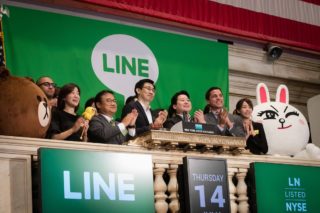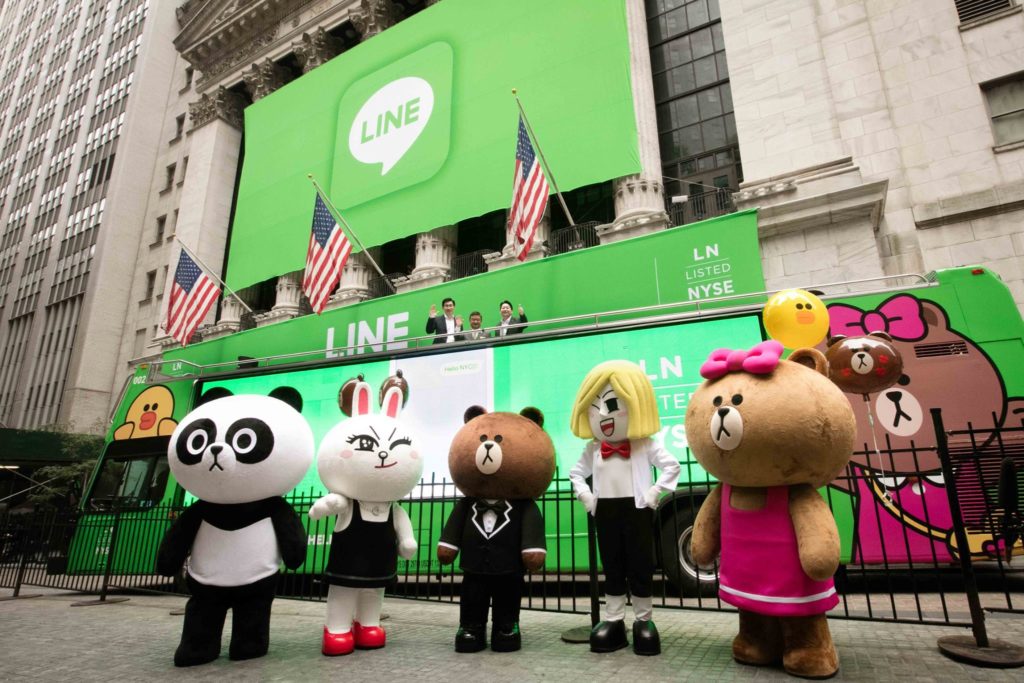Japanese social networking firm LINE Corp. made its debut on the Tokyo and New York markets last Thursday at a $1.5 billion valuation. It’s the largest tech IPO to date this year and is the first Japanese company to list its IPO in the US since 2000. LINE is owned by South Korean internet company Naver Corporation. Over the last 12 months, LINE generated $1.1 billion in revenue. LINE’s IPO raised $1.26 billion for the company, and its share price jumped 27 percent from the opening, an impressive beginning.
What This Has To Do With The Games Market
LINE claims 218 million monthly active users across 230 countries and generates about 35 percent of its annual revenue from what it calls “games and music.” LINE’s strength appears to be its ability to engage its audience. While there are many other messaging apps that offer communication functionality, few can match LINE’s success in providing entertainment and games.

Is This A Competitor To Tencent?
Yes . . . and no. Despite having a monthly active user base that’s roughly a third of Tencent’s, LINE holds a dominant stake in the most valuable mobile games market in the world. In 2015, spending on mobile games in Japan totaled $7.48 billion, compared to $5.77 billion in China, where Tencent dominates. The average monthly spending per paying user in Japan was $62.74 (over the whole of 2015), compared to $20.15 in China.
With a solid grip on such a valuable audience, LINE presents a small but formidable competitor to China’s titan Tencent. What LINE currently lacks, however, is a more pronounced content strategy to further drive monetization and engagement. It remains to be seen if the two firms will truly be head-on competitors, as neither firm is strongly incentivized or capable to penetrate the other’s market. Tencent’s WeChat has 762 million users compared to LINE’s 218 million. It’s more likely that both will seek to appeal to western audiences in the future to expand their addressable markets, once they’ve reached a natural limit on their own. The recent acquisition of Supercell is evidence of the move of Tencent in that direction.
What Does This Mean For The Market At Large?
There is an increasing emphasis on capturing and engaging audiences. Both Tencent and LINE both directly monetize their audience with micro-transactions, and earn revenue from advertisers. As interactive entertainment becomes increasingly mainstream, the ability to operate a dual-product strategy becomes more sustainable. As Asia tends to be several years ahead of western markets in terms of technological innovation and business models, we anticipate similar strategies to become more prevalent in North America and Europe in the coming years. The implications for marketers are great, because messaging has become important in app discovery overseas—but not in the US. This could potentially open up some critical new marketing strategies if LINE chooses to use some its newfound cash to boost its presence in other countries.
Joost van Dreunen, the CEO and co-founder at SuperData Research, joined [a]listdaily to further discuss the matter.

Tencent, with WeChat, LINE, and Kakao, have been hugely important in their respective markets through the use of messaging apps to spur game discovery and installation. That never seems to have taken hold elsewhere in the world. Why is that?
In markets like China, Korea and Japan, gamer audiences show a stronger affinity with mobile, among other things, due to the relative price point of PC and console hardware.
Now that Facebook Messenger allows apps, and the new iMessage in iOS 10 allows apps, could we see more game companies using messaging as a means of game discovery?
Entertainment companies, especially on mobile, will start integrating messenger app functionality to build their user base. Discovery continues to be a challenge for companies in the space. It also opens the market up to new revenue models, allowing game companies to rely more on ad revenue, provided they can build a large enough, and relevant, user base that is of interest to brands and advertisers.
Both LINE and WeChat have limited presence outside of their home markets. With LINE’s big cash infusion, do you expect that they’ll seek to expand their messaging presence to other countries? Which ones seem like good targets for them?
International expansion is certainly on the roadmap for all of the messenger app companies. What has made LINE successful is allowing each country’s team to localize the offering. Rather than rolling out a single, uniform mobile chat application, each country’s version differs, which has benefitted retention and monetization.
Tencent’s purchase of Supercell gives them a huge presence in the gaming market: Riot Games, Epic Games, a big chunk of Activision Blizzard as well. Do you see Tencent trying to use this broad array of gaming properties to help move their messaging app WeChat into other countries?
It’s an obvious move for Tencent to leverage their access to all this great content to expand their footprint and increase average spending. What’s less obvious is whether they consider themselves a Chinese monopolist that owns assets beyond its borders, or a global entertainment firm.
Tencent is also making deals in advertising and luxury goods, as well as in gaming. Do you see gaming remaining the company’s biggest source of revenue, or do you think they are trying to grow other parts of the business faster? Will Tencent be looking for connections between games and its many other interests?
In principle, Tencent is content-agnostic. If fashion or business news were a better driver of success they’d pursue that instead of games. But there’s currently no reason to assume they’d abandon gaming and, instead, Tencent is more likely to build on its existing success.

